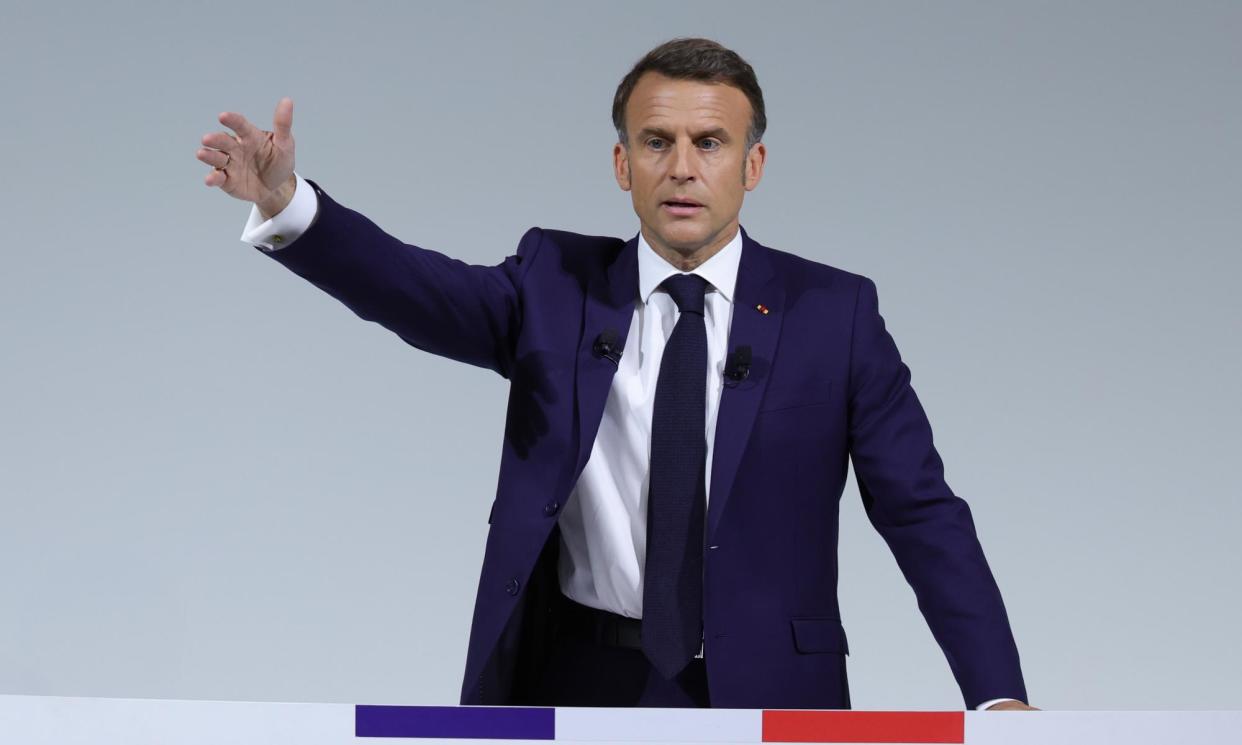Macron urges French parties to unite against far-right National Rally

The French president, Emmanuel Macron, has urged all parties to form an alliance against Marine Le Pen’s far-right National Rally and resist the “spirit of defeatism” after he announced a surprise snap election in response to the far-right’s large gains in European elections.
With the far right at a historic high and the French political class plunged into uncertainty with less than three weeks until the first round of the legislative vote, Macron said he had dissolved parliament and called the election in order to hold back “extremes”.
He said: “I do not want to give the keys to power to the far right in [the presidential election of] 2027, so I fully accept having triggered a movement to provide clarification.”
He said he trusted the French people to decide whether they wanted the far right in government – he believed the nation did not want them in power and would vote to keep it out.
Macron said he had taken into account the anger expressed in the European election vote in France, in which National Rally (RN) took more than 31% of the vote, which was more than double the result for Macron’s centrist grouping. The total vote for far-right parties reached almost 40%.
Related: Three possible outcomes of Macron’s shocking snap election
He acknowledged voters’ “difficulty getting by, even when they’re working, very everyday difficulties” that had created “anger, sometimes resentment”.
People “feel that they aren’t listened to or respected … We can’t remain indifferent to all these messages,” he said.
Macron said the policies of RN would impoverish workers and pensioners and be bad for the economy. He said: “You’ve expressed anger; message received. But is an expression of anger the answer to your daily life? I say no.”
He described Le Pen’s party as a “political project that won’t be able to respond to the insecurity you’re feeling … What’s the concrete answer? They don’t have one.”
Macron, whose centrist grouping failed to win an absolute majority in parliament in legislative elections that followed his re-election in 2022, said he hoped for “clarity” from the electorate, which could lead to a broader governing coalition led by his centrists.
A poll by OpinionWay for CNews, Europe 1 and the JDD newspaper found 61% of French people approved the calling of a snap election after the far right’s European election success.
Macron said there were two extremes in France, which he called the far right and the far left. He said Jean-Luc Mélenchon’s leftwing La France Insoumise party was extreme and warned other parties on the left against an election alliance that included them.
After Éric Ciotti, the leader of the traditional right party, Les Républicains, announced – to the consternation of many of his colleagues – that he intended to form an alliance with Le Pen, Macron said French voters had a choice between what he called “unholy alliances at the two extremes who agree on almost nothing except handing out jobs”. He said his own centrist bloc had “a single vision of the country” at home and abroad.
Macron said: “I hope that when the time comes, men and women of goodwill who will have been able to say no to the extremes will come together … will put themselves in a position to build a shared, sincere project that is useful to the country.”
On the key issues for the election, Macron said he wanted to “launch a great debate on secularism in France”.
He also said France needed “simple, everyday decisions such as enabling the state to regain control on the issue of unaccompanied minors, who are a security problem in so many towns; respond more firmly to the rise in juvenile violence … and respond to the existing feeling of impunity with a justice system whose resources have been increased, but which must now also respond with faster, safer, clearer sentences.”

 Yahoo News
Yahoo News 
